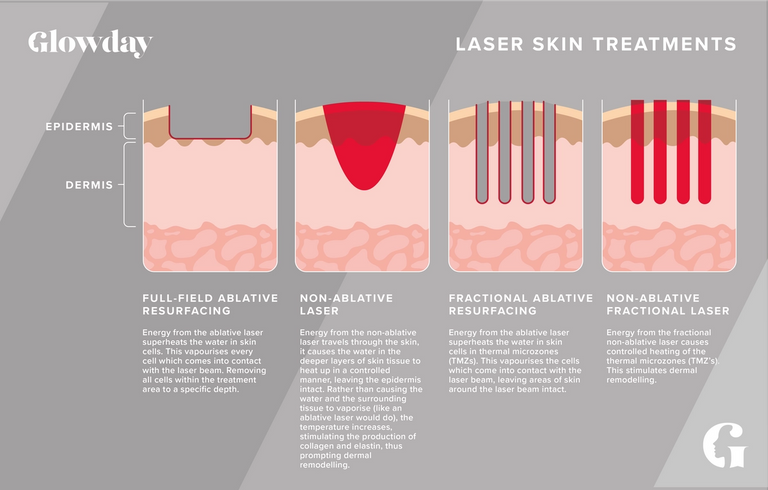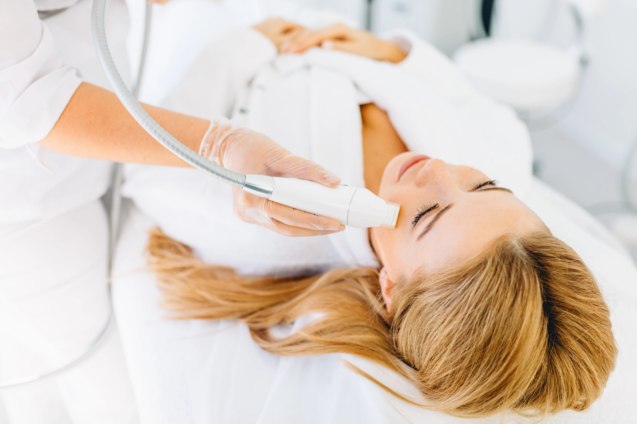Sarah’s self-esteem had dropped a lot. Every morning when she awoke, she hoped for a surprise. Unfortunately, her reflection just showed acne scars and red patches. Like many individuals throughout the globe, Sarah had acne. This skin condition may impact individuals of any age and is known to be both prevalent and irritating. Your mental health and sense of self-worth can take a hit when you deal with acne, which isn’t limited to your appearance. People are always looking for sound options; laser treatment seems promising for many. This article looks into how well laser treatment for acne works, trying to separate the truth from the hype.
Understanding Acne:
Acne, a common skin condition, can have several causes. These include hormonal shifts, oil production issues, bacterial overgrowth, and inflammation. Red, inflamed breakouts characterize inflammatory acne, whereas blackheads and whiteheads characterize non-inflammatory acne. Traditional medicine includes oral tablets, topical creams, and other medicinal products. In most situations, they provide temporary relief, but they may not be able to address more severe issues or fix the underlying cause.
Laser Treatment for Acne: Demystifying the Options:
People with trouble with acne now have a great option: laser treatment. It provides tailored answers that standard treatments might not fully meet. It is important to know the many types of acne lasers to make informed decisions regarding your skincare routine. Now, let us go into the specifics:
Pulsed Dye Laser (PDL):
PDL aims to reach the veins just under the skin’s surface. It works wonders on the redness and irritation that come with acne. PDL can significantly reduce the visibility of acne lesions by constricting these blood channels. If you suffer from chronic redness and flushing, it may help.
Ablative Lasers:
Fractional CO2 and other ablative lasers can remove the outermost layer of damaged skin. Their ability to stimulate collagen formation has a rejuvenating effect on the skin. Acne scars respond pretty well to these lasers. They restore a more youthful complexion and smooth out uneven skin texture.

Non-Ablative Lasers:
Nd:YAG and diode lasers are examples of non-ablative lasers that may reach deeper layers of skin without harming it. By acting on the sebaceous glands and stimulating collagen formation, they lessen oil production and forestall more outbreaks.
Combination Therapies:
Dermatologists may advise a mix of laser treatments when appropriate. Acne may be treated in several ways using these, including inflammation, scarring, and overproduction of sebum.
Effectiveness: Weighing The Evidence:
The dermatological community is very interested in and divided about the efficacy of laser therapy for acne. The many research outcomes that have examined its effectiveness have been all over the map. Among the beneficial effects that research states include improvements in skin texture, less inflammation, and a marked decrease in the severity of acne. After exposure to sunshine, 70% of patients undergoing laser treatments see an improvement in their acne. According to several patients, skin becomes noticeably clearer and less oily after laser therapy.
Regrettably, laser treatment does not work for every condition. While it could lessen the look of acne, it might not be able to eradicate existing pimples completely. The treatment results may also differ from patient to patient depending on variables such as skin type, the severity of acne, and adherence to aftercare guidelines. Consequently, even in cases where laser therapy appears promising, evaluating the procedure’s benefits and drawbacks is critical.
Beyond The Hype: Important Considerations:
It is essential to consider several vital variables before rushing into laser therapy for acne. The treatment’s appropriateness and possible results are heavily dependent on each factor:
Severity Of Acne:
One must assess the severity of acne before determining if laser therapy is appropriate. Mild to moderate cases may respond well to conventional treatment. However, a more drastic measure may be necessary to treat severe or cystic acne.
Realistic Expectations and Potential for Recurrence:
Laser therapy can significantly reduce Acne scars and severity, but it will not solve all your problems. Acne patients should be ready for the possibility of recurrence and the necessity of continuing maintenance therapies.
Possible Insurance Coverage and Expenses:
If you need more than one session of acne laser therapy, the cost might add up quickly. To alleviate the financial burden, thinking about the consequences and looking into potential insurance coverage options is necessary.
Disadvantages And Dangers:
The risks and complications of laser treatment are comparable to those of any other medical operation. Some of these adverse effects may include temporary redness, swelling, and scarring in extremely rare cases. Knowing these potential outcomes will allow you to make more informed judgments.
See A Professional:
Perhaps most importantly, see a dermatologist before undergoing laser treatment. In addition to diagnosing and treating skin conditions, dermatologists can also address patients’ queries and concerns. By doing so, they can guarantee that patients take the best possible action.
Finding The Right Solution:
Maintaining clean, healthy skin requires regular visits to a board-certified dermatologist. With their extensive training and expertise, these specialists can diagnose and treat each patient’s unique skin condition. Considerations including acne scarring, skin type, and previous medical conditions are all part of their process. Dermatologists can determine the best course of treatment, including laser therapy or other modalities, through individual consultations.
One may consider chemical peels, microdermabrasion, photodynamic therapy alternatives, or supplemental acne treatments. Laser therapy may be supplemented or improved by these. However, the foundation of any effective acne treatment plan is still seeing a specialist. For personalized recommendations and thorough treatment, see dermatologists. In their pursuit of healthier, cleaner skin, this can guarantee the highest potential results.
Conclusion:
Acne scars and persistent outbreaks have many people hoping for a laser treatment for acne. But distinguishing reality from fantasy is critical. Not everyone will benefit equally, but it has the potential to help some. Seeing a dermatologist should be your first step toward clearer skin. Understanding laser therapy and one’s options is an excellent place to start when trying to improve one’s skin health and self-esteem.
Individuals needing professional advice can access thorough dermatological treatments at Harley Street Hair Transplant Clinic. Make an appointment for a consultation right now to learn about your unique choices for treating acne and get your skin looking healthy and clear. And, if you’d like to book an appointment call our friendly team today on 0207 030 3370.

